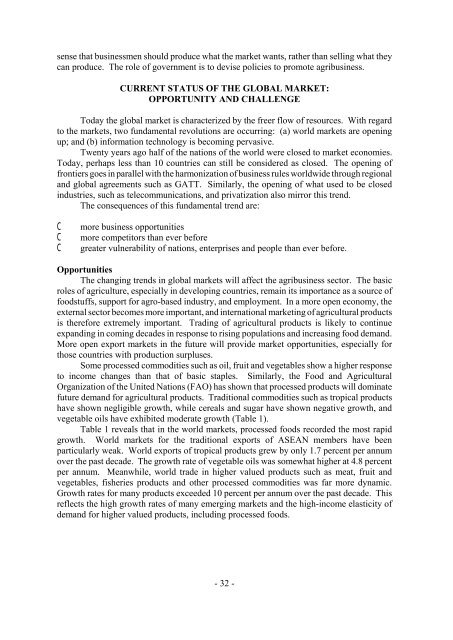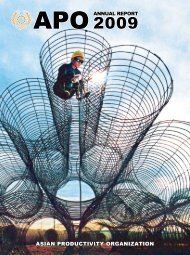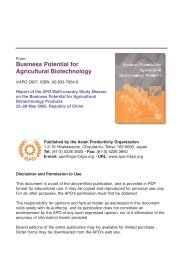Development of Agribusiness Enterprises - Asian Productivity ...
Development of Agribusiness Enterprises - Asian Productivity ...
Development of Agribusiness Enterprises - Asian Productivity ...
Create successful ePaper yourself
Turn your PDF publications into a flip-book with our unique Google optimized e-Paper software.
sense that businessmen should produce what the market wants, rather than selling what they<br />
can produce. The role <strong>of</strong> government is to devise policies to promote agribusiness.<br />
CURRENT STATUS OF THE GLOBAL MARKET:<br />
OPPORTUNITY AND CHALLENGE<br />
Today the global market is characterized by the freer flow <strong>of</strong> resources. With regard<br />
to the markets, two fundamental revolutions are occurring: (a) world markets are opening<br />
up; and (b) information technology is becoming pervasive.<br />
Twenty years ago half <strong>of</strong> the nations <strong>of</strong> the world were closed to market economies.<br />
Today, perhaps less than 10 countries can still be considered as closed. The opening <strong>of</strong><br />
frontiers goes in parallel with the harmonization <strong>of</strong> business rules worldwide through regional<br />
and global agreements such as GATT. Similarly, the opening <strong>of</strong> what used to be closed<br />
industries, such as telecommunications, and privatization also mirror this trend.<br />
The consequences <strong>of</strong> this fundamental trend are:<br />
C more business opportunities<br />
C more competitors than ever before<br />
C greater vulnerability <strong>of</strong> nations, enterprises and people than ever before.<br />
Opportunities<br />
The changing trends in global markets will affect the agribusiness sector. The basic<br />
roles <strong>of</strong> agriculture, especially in developing countries, remain its importance as a source <strong>of</strong><br />
foodstuffs, support for agro-based industry, and employment. In a more open economy, the<br />
external sector becomes more important, and international marketing <strong>of</strong> agricultural products<br />
is therefore extremely important. Trading <strong>of</strong> agricultural products is likely to continue<br />
expanding in coming decades in response to rising populations and increasing food demand.<br />
More open export markets in the future will provide market opportunities, especially for<br />
those countries with production surpluses.<br />
Some processed commodities such as oil, fruit and vegetables show a higher response<br />
to income changes than that <strong>of</strong> basic staples. Similarly, the Food and Agricultural<br />
Organization <strong>of</strong> the United Nations (FAO) has shown that processed products will dominate<br />
future demand for agricultural products. Traditional commodities such as tropical products<br />
have shown negligible growth, while cereals and sugar have shown negative growth, and<br />
vegetable oils have exhibited moderate growth (Table 1).<br />
Table 1 reveals that in the world markets, processed foods recorded the most rapid<br />
growth. World markets for the traditional exports <strong>of</strong> ASEAN members have been<br />
particularly weak. World exports <strong>of</strong> tropical products grew by only 1.7 percent per annum<br />
over the past decade. The growth rate <strong>of</strong> vegetable oils was somewhat higher at 4.8 percent<br />
per annum. Meanwhile, world trade in higher valued products such as meat, fruit and<br />
vegetables, fisheries products and other processed commodities was far more dynamic.<br />
Growth rates for many products exceeded 10 percent per annum over the past decade. This<br />
reflects the high growth rates <strong>of</strong> many emerging markets and the high-income elasticity <strong>of</strong><br />
demand for higher valued products, including processed foods.<br />
- 32 -
















